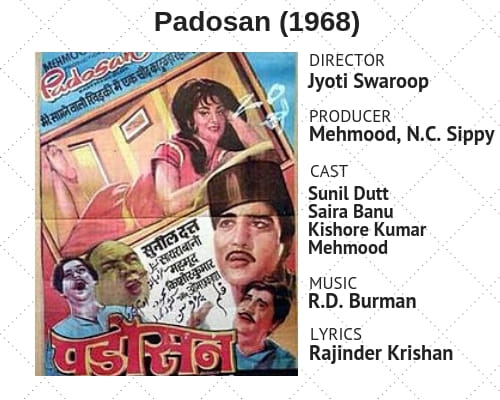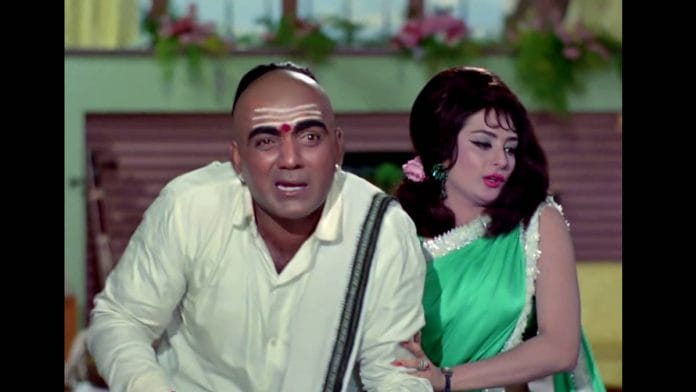Cult comedy Padosan features Hindi cinema’s most popular duet and never runs out of laughs.
“Bhole, neeche se gao. Neeche se (Bhole, please sing from a lower octave).”
Bhola quietly gets down and sits on the floor, only to resume singing terribly.
 As cult comedy films go, Jyoti Swaroop’s Padosan is one of the few in Hindi film history to never run out of laughs. This is an even more remarkable trophy because such a movie cannot be made again in today’s Republic of the Easily Offended, i.e., India. The trademark innocent lunacy of the lovable film turned 50 this year (last week, if you’re confident enough to trust Wikipedia).
As cult comedy films go, Jyoti Swaroop’s Padosan is one of the few in Hindi film history to never run out of laughs. This is an even more remarkable trophy because such a movie cannot be made again in today’s Republic of the Easily Offended, i.e., India. The trademark innocent lunacy of the lovable film turned 50 this year (last week, if you’re confident enough to trust Wikipedia).
Comedian Mehmood was a rare star, a supporting actor who was an industry unto himself. When he decided to produce his first film, he chose something that was entirely his domain — a delightful physical comedy coupled with some endearing screechy Indian caricatures that surprisingly never make you cringe, even if you are the type who frowns upon Kapil Sharma jokes today.
Also read: Comedy king Mehmood who earned more than the lead actors of his films
Based on Bengali writer Arun Choudhary’s short story Pasher Bari (House Next Door), Padosan is an unlikely love story between two young neighbours.
With its bare-bones plot about an innocent naïve young man Bhola (Sunil Dutt), who falls in love with his dancer-singer neighbour Bindu (Saira Banu) and wins her over in a not-so-honest but oh-so-charming way, the focus in Padosan is entirely on scene mechanics and individual performances.
Enter comedic giants – Mehmood and singer-star Kishore Kumar.
While Mehmood plays a caricature of a South Indian man, Kumar plays a pan-chewing caricature of a Bengali theatre director. Rajinder Krishan’s screenplay creates two camps – the young man’s groupies and the woman’s groupies.
Vidyapati (Kumar) is tasked with assisting Bhola in winning over the headstrong, loose-tempered and difficult Bindu. The only way, apparently, to woo her is through music. And that is what Bhola will be trained to charm his way into Bindu’s artistic heart through singing. But Bhola is tone deaf and can’t sing to save his life. So the next best thing is to fake it till you make it. Vidyapati sings and Bhola lip-syncs. The hurdle they face comes in the form of Bindu’s music teacher Masterji (Mehmood), who is more of a suitor to her.
So, they fight – in the way only they can. The singing duel that follows is one of Hindi cinema’s funniest songs picturisations. All leads let go in a loose-limbed song that actor Shah Rukh Khan once called the most romantic of all time.
“Langde ghode,
Arre dekhi teri chaturayi…”
“…Ye gaali diya ji”
In the song, Mehmood says ghoda in a way that should’ve offended every ‘Madrassi’, but it ended up endearing him to South Indian audiences. Even today, nobody has gone to court saying they are offended by Padosan, even though there are plenty of groups who have petitioned against ethnic jokes. But those were simpler times, as the cliché goes.
The song left a deep and lasting impact in India’s pop culture – resurfacing again and again in music, movies and wit.
Last year, actor Kamal Haasan picked Padosan as one of his 70 favourite Indian films. He had this to say of Mehmood: “When I went to see Padosan, I went to protest against it – we had been told it was a film where South Indians were made fun of. We went in to agitate, came out smiling, as fans of Mehmood saab, imitating him.”
Also read: When Kishore Kumar spoke to Pritish Nandy about Bombay, Hitchcock and his many wives
In a film where characters exist only as (endearing) caricatures, and where two veterans threaten to steal the film in every scene, both Sunil Dutt and Saira Banu are charming enough to make their presence felt. Minor characters like Bhola’s uncle and aunt also keep their own space.
Think Bhola’s storming out of his mama’s house, or entering mami’s home, or Bhola singing his heart out to Bindu in “Mere Saamne Wali Khidki Me”.
The soundtrack of Padosan was not just a milestone in the career of legendary R.D. Burman but also in Hindi films. A total of nine songs, written by Krishan himself, each more memorable and melodious than the last: The on-the-run breezy “Main Chali Main Chali”, or the dreamy “Sharm Aati Hai Magar”, or the love-infused melodious “Kehna Hai”. Play them on a Saturday evening even today and you will find it difficult to turn them off.
Of the nine, the most interesting story exists behind the song “Ek Chatur Naar”. Kishore Kumar is believed to have suggested this one. But it actually comes a 1941 film starring Kumar’s elder brother and star, Ashok Kumar. In Jhoola, Ashok Kumar delivers a much slower rendition of the song.
Few Hindi films are recognised by their voices and sounds. Padosan is that rare gem in which an inflection here, a change of tone there, is all that it takes. Mehmood and Kishore Kumar’s performances are an aural artistry of another kind and there is absolutely no excuse to not hear its pleasures again and again.







If u feel it’s only in today’s India that this movie cannot be shot, it means you have no idea what u have written. Go back to your article that talks about Kamal Hassan’s view on protesting / enjoying. You are contradicting yourself !
Well said. But it is the wildfire nature of the way offence is taken, mis-informed and the resultant hatred spread these days that may be the difference, credits to technology.
Often I would be having breakfast before leaving for Bishop’s School, Poona when Mere saamne wali khidki mein would be playing on the radio.